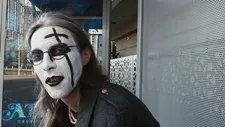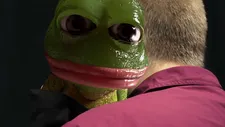 |
| You Can't Kill Meme Photo: Fantasia International Film Festival |
Inspired by R Kirk Packwood’s 2004 book Memetic Magic, You Can’t Kill Meme is an ambitious documentary looking at the intersection of occult belief and the internet. Screened as part of the 2021 Fantasia International Film Festival, it provides an introduction to the impact of such thinking on a wide range of issues, from the 2017 Kek wars to the 6 January invasion of the US Capitol building, focusing in particular on its adoption by the far right. There was just something about Packwood’s book that sparked her interest, said director Hayley Garrigus when we met to discuss the film during the final days of the festival.
I tell her that the first thing it brought to mind for me was .the famous Arthur C Clarke quote ‘Any sufficiently advanced technology is indistinguishable from magic.’ Have we basically reached a point where there's so much information out there and new information is emerging at such a pace, and the systems are so complex, that individual human mind can no longer process it rationally?
“Yes, 100%. And even like today, or this past week, they're online – there are a lot of people who are talking about hexing the Taliban. Using what, you know, is meme magic with this collective magical force. Obviously there aren't a lot of politics in that. It's just well minded people who don't like the Taliban. And they're like, let's hex them out, you know. And then there were some threads that even said, ‘You know, I tried to hack the Taliban, and then I had like, a horrible migraine for two days. Do you guys think that they're using magic also?’ It's just in the community. People are going towards this in order to feel as if maybe they have some kind of power. And, you know, it may be a very powerless situation.”
I note that it also reminded me a lot of things that I've read in Mediaeval books on magic – the same patterns of thinking and the way that people are looking for proofs of what they're doing, and so on. In the film, Hayley makes a connection to the emergence or worship of gods. Did that idea come from the book, or from the people she spoke to, or was it her own?
 |
| Billy Brujo in You Can't Kill Meme Photo: Fantasia International Film Festival |
“It was a mix,” she says. “There was so much more in the film, but we really had to cut it down for the narrative’s sake. I went through several three hour cuts. So there's a lot that we had to sacrifice in order to make it somewhat palatable. Really, I understand this as the maker, and my producers understand this, that it's definitely a movie that asks a lot of viewer. You know, you definitely have to be either interested or open to it, or just paying attention the whole time. You can really lose the threads very easily.”
We agree that there’s a clash between what people can arrive at or work out rationally, and what's within reach intuitively – and that that our brains are much better at processing information in the latter way, but that people aren't always very aware of that about themselves and their own psychology. I ask about the comparisons that various critics have made to Arthur Jones’ documentary Feels Good, Man, and how odd those seem in light of the fact that he’s clearly trying to approach a much broader issue.
“It's funny,” she says, “because we kind of knew, because if you mention Pepe, you're going to get, ‘Oh, well, there's this little movie about Pepe and his creator!’ And that is a thing, beyond any sort of constructive criticism or just, you know, things that people are pointing out but that I also know as the director.
“I think the comparison to Feels Good, Man is the most frustrating because as you pointed out, it's not about Pepe and it goes in many different directions and in local communities. How this becomes more mainstream, how people assign meaning to these these various points of magic or images. But you know, at the end of the day, it is what it is. If people watch it and that's their first reference point, they're like, ‘Oh, well, Feels Good, Man has much higher production quality and is much easier to digest, you should just go watch that,’ you know, then yes, I think if you're looking for a movie to explain 4chan, then you should watch Feels Good, Man. Because I definitely don't think my film explains 4chan in the same way. So just, you know, different audiences for different films.”
It seems to me that You Can’t Kill Meme is not only looking at a bigger picture, but that it’s introducing a big subject to a lot of different people. Maybe it's more an opening salvo in a conversation than something that's intended to provide lots of detailed answers.
“Yeah, definitely. And I think for people that watched my film and were able to get something out of it, really the thing that people are able to get out of it is that conversation. It's not like, ‘Oh, okay, I watched this from beginning to end and now I’m an expert on this subject.’ It’s like ‘Oh, interesting. What is this about?’ And then maybe you go and open a browser or open a book and explore that in your own direction.”
Something that I didn't know about before I saw the film is the lightworkers. I’d never come across them online and I heard that Hayley found them accidentally when looking for social opportunities rather than looking for subjects.
“Yes. And it was interesting because I think right now, especially after the January 6 events at the Capitol, where you had a self-described shaman in furs and with different symbols on him, or seeing the horseshoe in politics, but in spirituality, maybe the the deeper you go into spirituality, the more right leaning, often more conspiratorial ideas you'll have - or the opposite. And the the lightworker community, I think, definitely can be very insular. So it's maybe one of the reasons why they hadn't been seen or understood. They’re just in different online communities. But it seems like they're coming more and more to the surface, especially with newer social media like TikTok, and then having that sort of that coverage from the January 6 events. It seems to be breaking through.”
I say that I found that part of the film interesting because a lot of right wingers revel in being aggressive online so it’s easy to deal with them without feeling bad about it, but a lot o the lightworkers seem like lovely people, just with some very strange ideas. Did that make it more difficult to know how to interact with them or present them in the film?
“Yeah, that was definitely one of the biggest struggles that I had being in that world – because, you know, I really did go in with an open mind. And I understand that people believe things that I don't necessarily believe, but I'm not going to just pooh-pooh them immediately. I think we can always find grains of truth in anything, and understand context and understand their reference points and understand their histories and their traumas that, you know, may lead a person to have a certain set of beliefs.
 |
| It's not about the frog Photo: Fantasia International Film Festival |
“Being so open while I was filming with them, I had to continuously keep myself grounded in what I believe in and how I make sense of the world. And that may be different from how they make sense of the world. And so in order not to fall too deep into the rabbit hole at the end – because obviously, you kind of have to let yourself fall in order to be a little porous and open, in order to really have a good conversation – because obviously conversations are always going to be stunted if one party has a wall up, or has an agenda going into the conversation and you're not really getting a true discourse... You're always having blinders up with your own reference points. And so to keep myself grounded, I just had to talk to other people that weren’t involved, or reread certain books or just sit with myself. And that was the process of making the film. And then also, at the end of the film, when I finished filming and I started editing, I had to really take a breath for a moment and reorient. And that's what I did.”
A lot of the people we meet in the film are clustered around Las Vegas. What’s gong on with that?
I think if you ask anyone in the film, who's in Vegas - I think Carol talked about this – it’s the red rocks, and the history of the red rocks and sort of like the energetic balance of the Red Rocks, very similar to communities in Mount Shasta or Sedona. They're talking about mineral deposits underneath the city or outside the city limits. And then I also think, on another hand, Las Vegas is just this place where you can really build your imagination, and you can really build things that are outside of society without much pushback. It’s this place in the desert that wasn't really supposed to exist.
Did she discover many things that were completely new to her, when making the film?
“Definitely. I didn't know much about different alien societies that people believe in, or just the extent of how much people use magic in this way, or magical thinking, especially with memes online. And also what I learned was just the strength in these communities, how much they rely on each other, the glue that keeps them together. And how that really is the property that keeps them moving. You know, it's like that insulation on one hand, but it's also ‘Oh, I have a community of people who also believe in me, and also believe in these other things. And I feel strong.’”
This is obviously a situation that's constantly developing, so there have been a lot of changes in terms of what has become visible to the public over the past couple of years, definitely since the film started and maybe since the film was finished. How does one bring out a film like this in that space, and then engage with those dialogues and the fact that people will now be seeing things in a way that wasn’t possible earlier?
“Yeah,” she says. “So I started the film in 2016. pretty early on – it's been many years. And there was a point where we were just about done, and then Covid hit. Before we got distribution, we were just going to maybe put it online and see if it had a life. So one of the ideas that we had was perhaps just put it on its own website and then continue adding to the film every couple years. So then it's this long endurance project. It's maybe multiple hours long, because I could continue adding, because things continue happening that really speak to the thesis of the film.
“Talking about it now, you know, you brought up Feels Good, Man, that came out last year, and I'm pretty sure those guys started making it at the end of 2016, early 2017. I think people now have a certain language that maybe we didn’t back in 2016, when I started making that. It's really just about trying to be as sensitive as possible to understanding people's experiences of these phenomena. And, you know, bringing my own experience into it as well, in order to situate the film where I think it should be.”
Does she see herself returning to the subject at any point?
“I see this as a trilogy actually,” she says. “With a very loose theme, this theme of beliefs, how people make beliefs, and their communities. I have another another project that I'm working on that I actually think might be a series. And then I have a third feature or third instalment, a few years down the line, kind of wrapping this up in terms of the underlying theme.”
She applied to Fantasia at the suggestion of her distributor, Utopia, she says. “I had never really showed it a festival. We didn't have that plan to do festivals.”
There have been a lot of new discoveries along the way, she says.
“This has been a learning experience and a learning curve. Because, you know, it's, it's definitely one of those films that you have to watch carefully, and it seems to be a film that people either really hate or love. There doesn't seem to be much of like a middle.”
That sounds like day to day life on the internet, I suggest, and she laughs.
“I know! That may be what's happening. I knew it was going to be divisive. Definitely. And so seeing that feedback has really been eye opening in many different ways.”





















